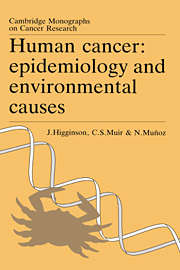Book contents
- Frontmatter
- Contents
- Contributors
- Preface
- Acknowledgements
- Historical introduction
- PART I Epidemiological methods
- PART II Causative factors in human cancer
- 6 The concept of cause: epidemiological considerations
- 7 Chemical factors
- 8 Occupational factors
- 9 Cultural factors: tobacco
- 10 Cultural factors: alcohol
- 11 Sexual behavior and reproductive factors
- 12 Nutritional factors
- 13 Physical factors: fiber carcinogenesis (including crystalline silicates)
- 14 Physical factors: implants and thermal chronic injury
- 15 Physical factors: ultraviolet (UV) light
- 16 Ionizing radiation
- 17 Biological causes
- 18 Genetic and other host-risk factors
- 19 Socio-economic factors
- PART III Legal and ethical considerations
- PART IV Introduction: total and specific site epidemiology
- PART V Buccal cavity
- PART VI Digestive system
- PART VII Respiratory system
- PART VIII Bone and soft tissue
- PART IX Skin
- PART X Breast and genitourinary system
- PART XI Eye and nervous system
- PART XII Thyroid and other endocrine glands, lymphoid and hematopoietic system
- PART XIII Cancers in children and multiple primary cancers
- Conclusions
- Appendix 1 Cancer statistics
- Appendix 2 A glossary of epidemiological terms
- Appendix 3 Acronyms and abbreviations
- Supplement
- Index
14 - Physical factors: implants and thermal chronic injury
Published online by Cambridge University Press: 03 May 2010
- Frontmatter
- Contents
- Contributors
- Preface
- Acknowledgements
- Historical introduction
- PART I Epidemiological methods
- PART II Causative factors in human cancer
- 6 The concept of cause: epidemiological considerations
- 7 Chemical factors
- 8 Occupational factors
- 9 Cultural factors: tobacco
- 10 Cultural factors: alcohol
- 11 Sexual behavior and reproductive factors
- 12 Nutritional factors
- 13 Physical factors: fiber carcinogenesis (including crystalline silicates)
- 14 Physical factors: implants and thermal chronic injury
- 15 Physical factors: ultraviolet (UV) light
- 16 Ionizing radiation
- 17 Biological causes
- 18 Genetic and other host-risk factors
- 19 Socio-economic factors
- PART III Legal and ethical considerations
- PART IV Introduction: total and specific site epidemiology
- PART V Buccal cavity
- PART VI Digestive system
- PART VII Respiratory system
- PART VIII Bone and soft tissue
- PART IX Skin
- PART X Breast and genitourinary system
- PART XI Eye and nervous system
- PART XII Thyroid and other endocrine glands, lymphoid and hematopoietic system
- PART XIII Cancers in children and multiple primary cancers
- Conclusions
- Appendix 1 Cancer statistics
- Appendix 2 A glossary of epidemiological terms
- Appendix 3 Acronyms and abbreviations
- Supplement
- Index
Summary
Scars and foreign bodies
Epithelial tumors and fibrous scarring
Carcinomas arise in relation to scar formation as observed in schistosomiasis and asbestosis, but it is not clear to what extent the scar formation per se actually contributes to these tumors. Several reports suggest that squamous cell carcinoma of the skin may arise as a complication of chronic ulcers, chronic inflammatory skin diseases, burns and scars or even a single injury. Traditionally this complication has been reported mainly in dark-skinned populations from Africa and Asia (Camain et al., 1972; Mulay, 1963), but has also been described in black Americans (Fleming et al., 1975; Keith et al., 1980). Case reports suggest that skin cancer occasionally complicates the scars of chronic skin diseases such as tuberculosis, leprosy, syphilis and discoid lupus (Keith et al., 1980). Both basocellular carcinoma and dermatofibroma have been reported to develop in a smallpox vaccination scar (Ribeiro et al., 1988).
In India, kangri cancer occurs in burn scars in the lower abdomen and thighs of people who use baskets (kangri) containing clay pots with burning charcoal to warm their bodies in winter (Mulay, 1963).
Soft tissue sarcomas (STS)
Foreign bodies
In rodents, the experimental transplant of a membrane, irrespective of its chemical nature, e.g. glass coverslip or plastic sheet, leads frequently to capsule formation followed by a soft tissue sarcoma.
- Type
- Chapter
- Information
- Human CancerEpidemiology and Environmental Causes, pp. 160 - 163Publisher: Cambridge University PressPrint publication year: 1992



